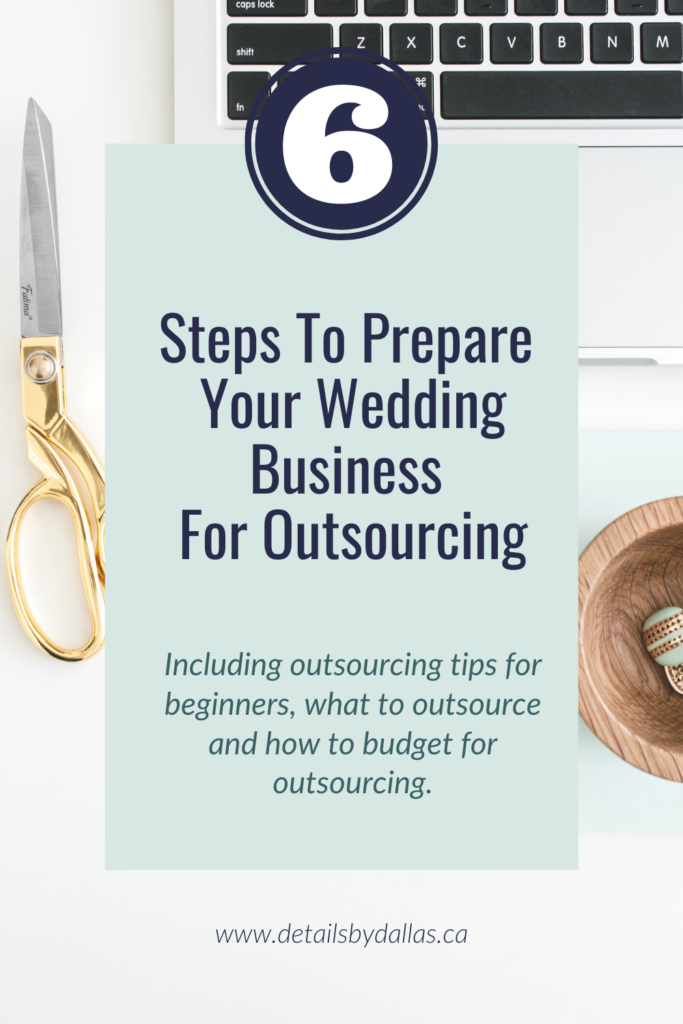You’re probably here as you are interested in outsourcing for your business. Congratulations on taking the first step and learning more about how to prepare your wedding business for outsourcing!
Outsourcing can be confusing and overwhelming for first-timers. I want to help make your outsourcing journey as smooth as possible. That’s why I’m sharing with you six steps to prepare your business for outsourcing.
1. Know your ideal client and your target audience
Before you even start the outsourcing process it is important to understand your business, the product or service you are selling and who you are selling it to.
By knowing who your ideal client is, you are able to better understand their wants and needs and are able to speak directly to them instead of the masses.
Be as specific and detailed as possible when describing your ideal client.
Some things to think about include:
- What are their struggles or pain points?
- What are their buying behaviours?
- What is their personality like?
- How do they speak?
It is important to start off with this step if you have not already done so. As it becomes increasingly difficult for your contractor to help you achieve your goals if you don’t know who you are speaking to.
2. Know your brand guidelines
To ensure a smooth onboarding process with your contractor, be sure to know your brand guidelines in advance. By not having your brand guidelines already created and easily accessible, you run the risk of slowing down the onboarding process.
In order to receive high-quality on-brand content from your contractor, I recommend having all of these details in advance.
Some key elements to include in your brand guidelines are:
- Brand colours,
- Brand font
- Brand logos
- Brand voice
For more branding tips I recommend checking out Danielle Connor’s website. She is a branding guru and can help you create the perfect brand for your business.
3. Determine your processes & systems
Prior to beginning your outsourcing, it is important to have some systems and processes in place.
I always recommend creating some standard operating procedures (SOPs) before outsourcing. You can make these via Google drive or by recording yourself on Loom. SOP’s are great so that when a contractor takes over the task it is done the way you’d like.
Along with SOP’s, it is helpful to have a customer relationship management system (CRM) as well as a project management system. Below, I will explain the difference between these two to avoid any confusion.
A CRM is used to organize your client’s information in one place. Such as contact information, emails, contracted packages, invoices and even appointments. I personally LOVE my Dubsado account and cannot live without it!
Project management systems such as Asana, Trello or Click Up are used to organize your tasks in one place. I would not recommend using a project management system to organize your clients as only some of their information is saveable to these systems.
Next, it’s key to have your documents on a virtual storage system such as Google Drive or Drop Box. Not only does this provide your business with a backup copy of all of your documents it ensures an easy and smooth onboarding with your contractor & prevents delays in beginning your work.
Having all of your client information, event photos, or vendor lists on your desktop does not help your contractor and will actually create more to-dos for you down the road. As most contractors work virtually, having these items on the cloud will help you share any relevant information faster.
Lastly, I recommend gathering your log-in details and passwords for any relevant applications and accounts that your contractor will use. In my business, I use Last Pass every day and would be lost without it!
4. Start with a list of tasks
I recommend sitting down and writing a list of ALL of the tasks that you do in your business. Then, go through that list and star any of the items that are in your zone of genius. These are the items that will stay on your to-do list.
Next, highlight which of the remaining items are a priority for your to outsource. Some items may be a higher priority based on your business’s goals.
Any remaining items on your list can either be delegated to another team member, eliminated as they are not providing you with a return on your investment or automated.
5. Determine a realistic outsourcing budget
Everyone’s business is different therefore everyone’s outsourcing budget is different. Take some time to review your finances and see what a realistic budget is for your business.
Once you have an idea of what you can afford begin interviewing contractors to see who is best for your business and your outsourcing goals.
If you find that you may have a variety of tasks that you need help with, I would recommend looking into a Virtual Assistant (VA). VA’s typically work on an hourly basis or monthly retainer and depending on their skillset they may be able to offer a preliminary knowledge of multiple applications.
Whereas, an experienced service provider may be an expert in only a few areas and can provide you high-quality services and high-quality content.
6. Know the goals you want to achieve
Before you begin outsourcing it’s best to think about the reason you are outsourcing. What goals do you want to achieve? They may be platform-specific or more generalized business/ personal goals ie) more website clicks from Pinterest & more time saved for your family.
It’s important to be realistic with your goals. If you have a platform-specific goal and are focusing all of your time somewhere else then I would recommend re-evaluating your goals. Don’t be afraid to ask your contractor their opinion and if they think the goals are realistic.
By setting realistic goals for your outsourcing you will be providing your contractor with key performance indicators to ensure they are on track.
Now I know this seems like a lot to do to prepare your business for outsourcing. Keep in mind that some of these items above can be outsourced to an expert such as your branding or your systems and processes.
Once you feel like you have a number of these items ready to go I recommend interviewing a number of contractors to see who is right for your business. Also, be sure to check out these outsourcing tips for beginners in one of my most recent posts!

This post may contain affiliate links and I may earn a small commission when you click on the links at no additional cost to you.
